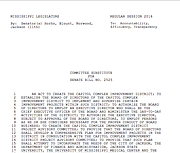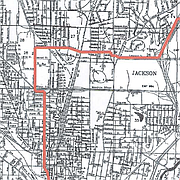Former Mayor Kane Ditto helped design the Capitol Complex Improvement District, which he says would free up City money to spend on areas not included in the plan. Photo by Imani Khayyam.
The goal behind the proposed "Capitol Complex Improvement District" is to free up City of Jackson funds to work on more neglected neighborhoods, one of the original architects of the plan, former Mayor Kane Ditto, said this morning.
"The state is the beneficiary of the growth in the Jackson metropolitan area. It just needs to provide certain resources annually, on a scheduled basis to the city," Ditto said at the weekly Friday Forum at the Koinonia Coffee House to a crowded room.
Ditto indicated that a big problem is that while he estimates 78,000 people travel into the city for work, very few of them stay and invest the tax dollars to pay for the upkeep to sections of town that are highly trafficked and notoriously expensive to repair.
The district, as outlined in the plan, includes mostly State-owned and -operated property, and the idea is to have that group pay its fair share of upkeep. He estimated the State's total investment in the area, such as real estate and buildings, to be around $5 billion.
"So the thought is, they have a huge asset-based risk, and given the financial condition of the city, they have a responsibility to recognize that the City is not going to be able to maintain this area the way it ought to be," Ditto said this morning.
The former mayor said that the money in the fund is tax dollars that the State owes to the City. If one of the two bills passes through the Legislature and is signed by the governor, the State would divert some of the collected money away from the general fund and into a source that the governing body of the "Captiol Complex Improvement District" could distribute.
"There are several great benefits to the city," Ditto said. "This is some of the most heavily used infrastructure in the city so it is very expensive to maintain it, to repair it, to replace it. So that obligation can be taken over by the state government."
"So then the city is free to spend that money on our arterial streets outside that area and on neighborhood streets. We all have horror stories about neighborhood streets that need fixing. This is one of the great places to free up resources in the city in order to that."
The State is limited in how they can spend those funds, Ditto said, but it includes "the usual suspects" such as streets, sidewalks, water and sewage, and drainage, as well as civic and public buildings to "enhance the aesthetics as well as the infrastructure."
Ditto said he understood the concern over the appointees on the governing board, a five-member entity with four seats split that the governor and lieutenant governor appoint, with only one member appointed by the mayor of Jackson.
"It's important to realize when drafting this legislation that this money is state dollars," Ditto said. "Unless this bill is passed, the money that is provided here goes to the general fund. The folks that provide the money also have control."
But Ditto emphasized over and over again that the state is only participating because it recognizes its own need to maintain the area. "I think this is most palatable, because they know this area is crucial to state government and the state as a whole," he said.
"I think that it is very important to the state that this area of capital city be in excellent condition in order to make an impression not only on our own citizens but visitors from out of state, visitors to the Civil Rights Museum (under construction), visitors to the governor's mansion, and those that want to invest money in our state and our city."
One of the authors of the bill, Sen. John Horhn, D-Jackson, spoke Wednesday at a Jackson 2000 luncheon where he addressed the bill. He told the audience at the Mississippi Arts Center that the state had a responsibility to help maintain what is essentially their property.
"The way I look at it is that most of this stuff is your stuff," Horhn said, as if addressing the State directly. "And you aren't paying a dime of taxes. And you are willing to (use) the taxes that are already being collected, instead of staying with the State directly, they go to this general fund, they would go into this special fund for the support of the capital city."
Horhn likened the relationship between the City of Jackson and the Mississippi Legislature to our nation's capital.
"It would be just the state taking responsibility, similar to what the federal government does in the District of Columbia," Horhn said. "There are buildings in certain areas of that city that the federal government takes care of. And in this case it would be the same thing, except it would be the state versus the city."
Horhn also mentioned that this would free up the funds that the City could then use in other parts of Jackson, where attention is desperately needed.
"Instead of the city coming up with the money to fix these pipes, the state is going to come up with the money. And to fix these bad streets in the areas I have described," Horhn said.
Email city reporter Tim Summers Jr. at tim@jacksonfreepress.com. Read more city news at jfp.ms/localnews.
More like this story
- Mo’ Money for Streets This Year?
- Blocking Digital Signs and Helping Small Business
- Legislature Passes Cap Complex Bill, Funds Will Kick in by 2018
- UPDATED: Capitol Complex Bill with Funds for Jackson Passes, Heads to Governor
- Capitol Improvement District Passes, Only 10% of Contractors Must Be Minority
More stories by this author
- DA Smith Wins on One Count, But Passes on 'Whistleblower' Bad Check Claims
- Mayor Yarber, Socrates Garrett Address Contracting Dispute, 'Steering'
- UPDATED: Jury Finds Allen Guilty for Cell-phone Payment, Not Guilty on Nine Counts
- Allen Trial: Defense Rests After Making Case DJP Doesn’t Collect 'Taxes’
- DJP Board Attorney Gibbs Takes Stand to Defend Ben Allen's Actions






Comments
Use the comment form below to begin a discussion about this content.